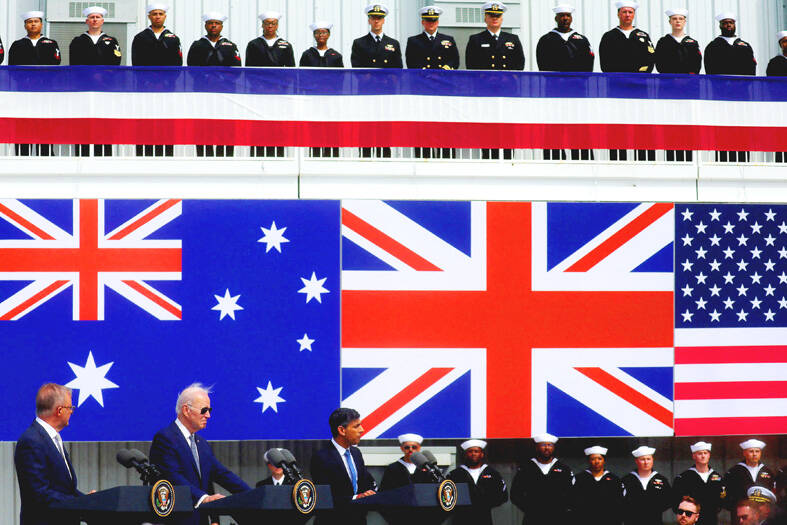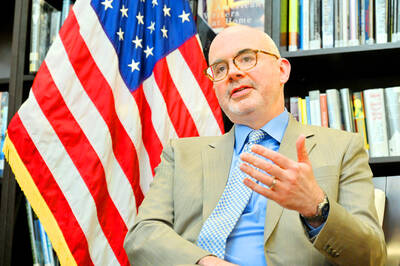Australia, the UK and the US are set to begin talks on bringing new members into their AUKUS security pact as Washington pushes for Japan to be involved as a deterrent against China, the Financial Times reported.
The countries’ defense ministers are today to announce discussions on “Pillar Two” of the pact, which commits the members to jointly developing quantum computing, undersea, hypersonic, artificial intelligence and cyber technology, the newspaper reported on Saturday, citing people familiar with the situation.
They are not considering expanding the first pillar, which is designed to deliver nuclear-powered attack submarines to Australia, the Financial Times said.

Photo: Reuters
US Deputy Secretary of State Kurt Campbell on Wednesday said that the submarine project could help deter any Chinese move against Taiwan.
AUKUS, formed by the three countries in 2021, is part of their efforts to push back against China’s growing power in the Indo-Pacific region. China has called the pact dangerous and warned it could spur a regional arms race.
US President Joe Biden has sought to step up partnerships with US allies in Asia, including Japan and the Philippines, amid China’s historic military buildup and its growing territorial assertiveness.
US Ambassador to Japan Rahm Emanuel wrote in an opinion piece published on Wednesday in the Wall Street Journal that Japan was “about to become the first additional Pillar II partner.”
A senior US administration official told Reuters on Wednesday that some sort of announcement could be expected in the coming week about Japan’s involvement, but gave no details.
Biden and Japanese Prime Minister Fumio Kishida would likely discuss expanding AUKUS to include Japan when the president hosts the prime minister in Washington on Wednesday, a source with knowledge of the talks said.
However, Canberra is wary of beginning new projects until more progress has been made on supplying Australia with nuclear-powered submarines, said the source, who asked not to be identified because they are not authorized to speak to the media.
Australian Minister for Defence Richard Marles has said they would “seek opportunities to engage close partners in AUKUS Pillar II” and any involvement of more countries would be decided and announced by the three partners, a spokesperson from his office said.
While the US is keen to see Japanese involvement in Pillar Two, officials and experts say obstacles remain, given a need for Japan to introduce better cyberdefenses and stricter rules for guarding secrets.
Campbell, an architect of US Indo-Pacific policy, said the US was encouraging Japan to do more to protect intellectual property and hold officials accountable for secrets.
“It’s fair to say that Japan has taken some of those steps, but not all of them,” he said.

SEPARATE: The MAC rebutted Beijing’s claim that Taiwan is China’s province, asserting that UN Resolution 2758 neither mentions Taiwan nor grants the PRC authority over it The “status quo” of democratic Taiwan and autocratic China not belonging to each other has long been recognized by the international community, the Mainland Affairs Council (MAC) said yesterday in its rebuttal of Beijing’s claim that Taiwan can only be represented in the UN as “Taiwan, Province of China.” Chinese Minister of Foreign Affairs Wang Yi (王毅) yesterday at a news conference of the third session at the 14th National People’s Congress said that Taiwan can only be referred to as “Taiwan, Province of China” at the UN. Taiwan is an inseparable part of Chinese territory, which is not only history but

CROSSED A LINE: While entertainers working in China have made pro-China statements before, this time it seriously affected the nation’s security and interests, a source said The Mainland Affairs Council (MAC) late on Saturday night condemned the comments of Taiwanese entertainers who reposted Chinese statements denigrating Taiwan’s sovereignty. The nation’s cross-strait affairs authority issued the statement after several Taiwanese entertainers, including Patty Hou (侯佩岑), Ouyang Nana (歐陽娜娜) and Michelle Chen (陳妍希), on Friday and Saturday shared on their respective Sina Weibo (微博) accounts a post by state broadcaster China Central Television. The post showed an image of a map of Taiwan along with the five stars of the Chinese flag, and the message: “Taiwan is never a country. It never was and never will be.” The post followed remarks

INVESTMENT WATCH: The US activity would not affect the firm’s investment in Taiwan, where 11 production lines would likely be completed this year, C.C. Wei said Investments by Taiwan Semiconductor Manufacturing Co (TSMC, 台積電) in the US should not be a cause for concern, but rather seen as the moment that the company and Taiwan stepped into the global spotlight, President William Lai (賴清德) told a news conference at the Presidential Office in Taipei yesterday alongside TSMC chairman and chief executive officer C.C. Wei (魏哲家). Wei and US President Donald Trump in Washington on Monday announced plans to invest US$100 billion in the US to build three advanced foundries, two packaging plants, and a research and development center, after Trump threatened to slap tariffs on chips made

CONSISTENT COMMITMENT: The American Institute in Taiwan director said that the US would expand investment and trade relationships to make both nations more prosperous The US would not abandon its commitment to Taiwan, and would make Taiwan safer, stronger and more prosperous, American Institute in Taiwan Director Raymond Greene said. “The US’ commitment to Taiwan has been consistent over many administrations and over many years, and we will not abandon our commitment to Taiwan, including our opposition to any attempt to use force or coercion to change Taiwan’s status,” he said in an exclusive interview with the Liberty Times (the sister newspaper of the Taipei Times) on Friday last week, which was published in the Chinese-language newspaper yesterday. The US would double down on its efforts